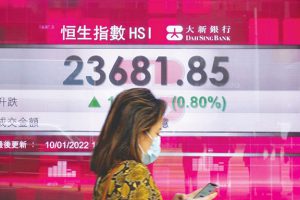Bloomberg
Stocks in Asia nudged higher on Monday as investors brace for the bond-market volatility and stimulus withdrawal. The dollar rose.
Shares in Hong Kong advanced as technology stocks rebounded. They fall in South Korea, while China edged higher. US futures inched upward after the S&P 500 posted the worst start to a year since 2016, as expectations of faster-than-anticipated US interest-rate increases roiled bond markets and sparked a rotation out of high-growth equities. Japan is shut for a holiday on Monday. European futures gained.
Treasury yields climbed, after advancing across the board last week in a selloff sparked by Federal Reserve minutes signaling a willingness to start hiking rates as soon as March. Cash Treasuries didn’t trade in Asia because of
the Japan holiday. Australia’s 10-year bonds tumbled.
US inflation data this week will be keenly watched as concerns grow the Fed is behind the curve in tackling elevated price pressures. US employers added fewer staff than expected in December, but wages rose more than forecast, boosting the Fed’s case to tighten liquidity.
Markets face increasing volatility as investors grapple with how to reprice assets as the pandemic liquidity that helped drive equities to record highs is withdrawn. Goldman Sachs Group Inc now expects the Fed to raise rates four times this year and start its balance sheet runoff process in July, if not earlier.
“The US Fed needs to tread carefully in removing policy accommodation – it should not happen too fast otherwise it risks a disruption to the rebound in economic growth and could lead to another ‘taper tantrum,’†Diana Mousina, senior economic in the multi-asset group at AMP Capital, said in a note. She sees more volatility this year from inflation, Fed rate hikes and geopolitics as well as US mid-term elections.
Brace for Volatility
Comments from a host of Fed speakers this week will be scrutinised for clues on the central bank’s schedule to trim the accommodative monetary policy.
“Inflation is the biggest concern and that’s why you have to brace yourself,†Al Lord, Lexerd Capital Management founder and chief executive officer, said on Bloomberg Television. “Rates are going higher, there is no doubt here. The Fed is behind the curve. We certainly have to brace ourselves for volatility here.â€
At the same time, the spread of omicron is posing a fresh test for economic activity. China is seeing its first omicron cases in the community, and as the Lunar New Year festivities approach, governments in Taiwan and Vietnam prepared to intensify curbs.
Elsewhere, Bitcoin traded around $42,000 as cryptocurrencies continue to struggle. Crude oil steadied around $79 a barrel after recording the biggest weekly gain in a month.
S&P 500 futures rise 0.1% as of 7:01 am in London and the S&P 500 falls 0.4%. While Nasdaq 100 futures rise 0.4%, the Nasdaq 100 falls 1.1%.
While Australia’s S&P/ASX 200 Index falls 0.1%, South Korea’s Kospi index slipped 1% and Hang Seng Index rises 1%. Shanghai Composite Index rises 0.4% and euro Stoxx 50 futures also climb 0.3%.
While the Japanese yen was at 115.78 per dollar, down 0.2%, the offshore yuan was at 6.3783 per dollar. The Bloomberg Dollar Spot Index rises 0.1% and the euro was at $1.1332.
While the yield on 10-year Treasuries advanced about two basis points to 1.79%, Australia’s 10-year bond yield rises six basis points to 1.92%.
West Texas Intermediate crude rises 0.3% to $79.10 a barrel and gold was at $1,793.11 an ounce, down as much as 0.2%.
 The Gulf Time Newspaper One of the finest business newspapers in the UAE brought to you by our professional writers and editors.
The Gulf Time Newspaper One of the finest business newspapers in the UAE brought to you by our professional writers and editors.
